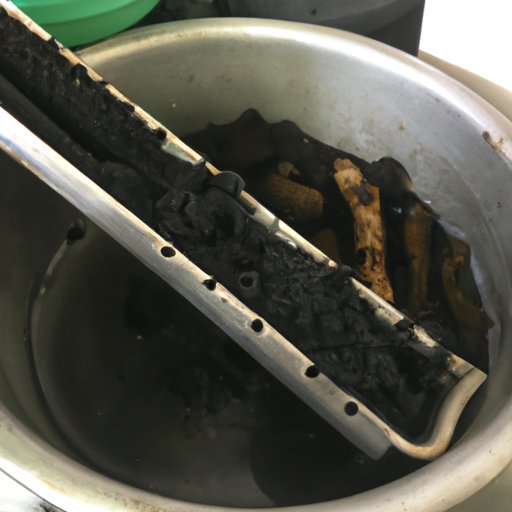
I. Introduction
Coffee is one of the most popular beverages consumed worldwide. In fact, according to a survey conducted by the National Coffee Association, 64% of Americans enjoy a cup of coffee every day. However, with the increase in coffee consumption comes the problem of how to properly dispose of coffee grounds.
Many people wonder if it’s okay to put coffee grounds down the sink. Unfortunately, the answer is not a straightforward yes or no. In this article, we will explore the various types of coffee grounds, their impact on the environment and plumbing systems, step-by-step guides for eco-friendly disposal, and much more.
II. Compare and Contrast Different Types of Coffee Grounds
Coffee grounds can be categorized into various types such as brewed, instant, and espresso. It’s essential to know the difference between these types before disposing of them.
Brewed coffee grounds typically have a longer breakdown period compared to instant or espresso. Instant coffee contains more non-biodegradable particles, which can cause clogs in plumbing when disposed of down the sink. Espresso coffee grounds tend to be more compact and take longer to decompose.
When it comes to the environment, unbleached filters, organic coffee grounds, and shade-grown coffee have a lesser impact, but they all depend on how they are disposed of.
III. Step-By-Step Guide for Eco-Friendly Disposal of Coffee Grounds
Discarding coffee grounds in the trash is not always environmentally friendly, especially if they end up in landfills. A better way to dispose of coffee grounds is by composting or repurposing them.
If you choose to compost the coffee grounds, it’s important to learn the basics of composting. Mix the grounds with organic wastes like vegetable and fruit peels, grass clippings, and leaves. The compost produced can be used as a natural fertilizer for plants. It’s also possible to use coffee grounds to control garden pests such as slugs and snails.
Another way to repurpose coffee grounds is by using them as an exfoliator or deodorizer. You can make a facial scrub by mixing one tablespoon of grounds with one tablespoon of coconut oil and a few drops of essential oil. For deodorizing, place dried coffee grounds in a sachet and use them as an air freshener in your car or closet.
IV. Potential Damage Coffee Grounds can Cause to the Pipes and Sewer Systems
Putting coffee grounds down the sink can cause significant damage to plumbing systems. When grounds mix with grease and other food particles, they create a thick and smelly sludge that can clog pipes.
Clogs can cause sewage backups into homes and buildings, leading to costly repairs and health hazards. The long-term effects of clogs caused by coffee grounds can also harm sewer systems, resulting in damage that is difficult to repair.
To avoid costly repairs, it’s best to limit what you put down the sink. Overloading the garbage disposal or pouring grease or coffee grounds down the drain can cause expensive damage that requires professional assistance to fix.
V. Alternatives to Disposing of Coffee Grounds in the Sink
There are several alternatives to disposing of coffee grounds down the sink to help the environment. One great way is by donating used coffee grounds to neighbors who compost or have gardens.
Some companies collect coffee grounds for recycling and repurposes them in various ways. For instance, the waste management company Veolia UK & Ireland partnered with coffee maker Nestle to use coffee grounds as a renewable energy source.
Another method is upcycling, where you can use coffee grounds to dye fabric or to make homemade candles. These are just a few examples of how to repurpose coffee grounds.
VI. Addressing Common Misconceptions
There are many myths surrounding coffee grounds and their impact on the environment.
One common myth is that coffee grounds are beneficial to garden plants. While they can be useful, they’re not a magical elixir that will instantly make plants grow. Used coffee grounds contain very little nitrogen, which is vital for sound plant growth. The nutrients they provide are small and can easily be made up with the addition of other ingredients.
Another popular belief is that coffee grounds can help clean and deodorize the sink. While it’s true that coffee has its natural smells, its ability to clean and deodorize is questionable at best.
VII. Tips on Cleaning a Clogged Sink and Preventing Clogs
If you do find yourself with a clogged sink due to coffee grounds, there are a few things you can do to fix it. One of the most popular methods is using a plunger. If that doesn’t work, a drain snake is the next best step.
To prevent future clogs, it’s essential to avoid disposing of coffee grounds down the sink. Consider using a composting bin or repurposing the grounds. Also, avoid putting other oily or greasy food products down the sink. Dispose of these items in a garbage can instead. Regularly cleaning and maintaining the sink can also help prevent clogs.
VIII. Conclusion
The proper disposal of coffee grounds is critical to the environment and plumbing systems. Educating yourself on the various types of coffee grounds and alternative disposal methods can help reduce waste and, in turn, have a positive impact on the planet.
Remember, coffee grounds should not be put down the sink due to the problems they cause. By composting, repurposing the grounds, and avoiding overload, we can protect our environment and ensure the longevity of our plumbing systems.
Practice sustainability in your everyday life and encourage others to take part in the movement as well.




